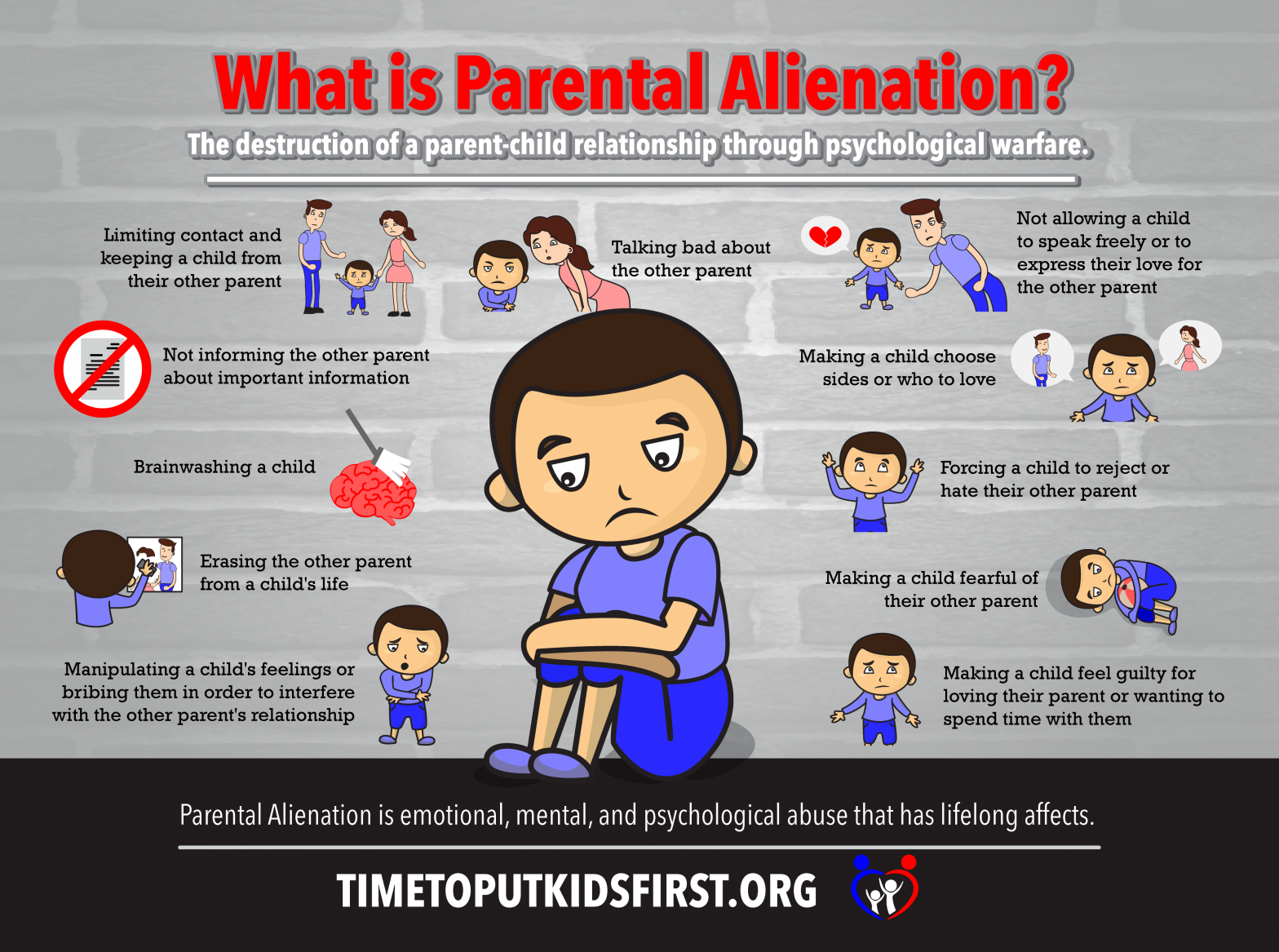
MacLean Law’s family lawyers provide the Best BC parental alienation strategies. New studies by Amy Baker and others have established a comprehensive set of factors to guide separated spouses, courts and lawyers. This new set of factors help courts decide if parental alienation is in fact occurring or whether a child’s rejection of one parent is justified by that parent’s compromised parenting capacity. Parental Alienation is a big deal says Forbes.
The best BC Parental Alienation Strategies involve having your top lawyer provide a solid evidentiary basis backed by experienced expert analysis and thorough psychological assessments. Less than half the cases, where someone alleges Parental Alienation, result in a finding that this odious syndrome in fact occurred. The higher conflict the separation is the more parental alienation may be in play. Our multi award winning parental alienation lawyers know the greatest predictor of compromised child development is when both parents fight incessantly after separation. Our seasoned and award winning family lawyers can guide you to prevent parental alienation from harming your children. Ask about our winning record on shared parenting in parental alienation cases.
Best BC Parental Alienation Strategies 604 602 9000
So how does a parent prove parental alienation or prove it is not happening at all? Our top rated lawyers have successfully handled dozens of cases where parental alienation is raised. In this blog, Lorne MacLean, KC sets out the best BC Parental Alienation Strategies that are designed to help you understand what parental alienation is and is not.
MacLean warns that any procrastination in dealing with parental alienation is often catastrophic. Reach out to our award winning family lawyers immediately if the issue of parental alienation, gatekeeping, or defective parenting capacity is a concern.

A recent Psychology Today cites Amy Baker:
- A new study reveals a comprehensive way to evaluate for parental alienation.
- Evaluating data from four-factors can determine a valid conclusion of parental alienation.
- The model provides more confidence and direction in matters of custody, visitation, and therapy.
Psychologist, Amy Baker’s new Four-Factor Model 604 602 9000
1) Presence of a prior positive relationship between the child and now rejected parent
The “premise of parental alienation theory is that the favoured parent has turned the child against a parent with whom the child at one time had a close and loving bond….This factor precludes parents who were habitually absent, uninvolved, and uncaring from claiming that they are victims of parental alienation.” (Baker, p. 3).
It’s important for the alienated parent who wants to prove they have been subjected to parental alienation to a lawyer, court, or therapist that a close and loving bond with their child had existed earlier in their relationship. Some ways to do this would be to provide evidence of close, positive interactions.
2) Absence of maltreatment or seriously deficient parenting on the part of the now rejected parent.
When the rejected parent has no history of malice or poor parenting of a child, it sheds light on parental alienation as the cause of the rejection. At the same time, it’s important to determine for legal or therapeutic reasons that the child was exposed to parental alienating behaviors by the favored parent.
3) Use of multiple alienating behaviors on the part of the favored parent.
When abuse and neglect can be identified on the behalf of the rejected parent, an alternative explanation is plausible negating the argument of parental alienation as the reason for the child’s rejecting behavior. An example from domestic abuse cases, is the abusive parent declaring that the distant relationship with a child is the result of being alienated by the other parent rather than their own abusive behavior that intimidated and pushed away their child.
In this case, the actions and attitudes of the favored parent negatively persuades the child’s perception of the other parent beyond the realistic experience with that parent.
Baker identified 17 primary behaviours used to alienate a targeted parent (Baker, p. 4-5).
- Criticizing the other parent in front of the children
- Limiting contact by interfering with the other parent’s visitation
- Interfering or preventing phone calls to the other parent during visitation
- Destroying the child’s pictures of the other parent
- Withdrawing love if the child loves the other parent
- Telling the child that the targeted parent doesn’t love him or her
- Forcing a child to choose between parents
- Creating the impression that the targeted parent is dangerous
- Confiding in a child of the other parent’s unsavory behavior
- Forcing a child to reject their other parent
- Asking a child to spy on the other parent
- Asking a child to keep secrets from the targeted parent
- Referring to the targeted parent by a first name
- Referring to a stepparent as “Mom” or “Dad” and encouraging a child to do the same
- Withholding medical, academic, and other important information from the targeted parent/keeping their name off relevant documents
- Changing a child’s name to remove association with the targeted parent
- Cultivating dependency–making the child feel they need to be with the parent to be okay, or making the child feel the parent needs them to be okay.
Using even some of these behaviors can be harmful and make the case for parental alienation. A parent can keep evidence of alienating behaviors such as saving texts, emails, and anything else that can support parental alienation.
4) Exhibition of the eight behavioral manifestations of alienation by the child.
From both clinical and research support, alienated children behave quite differently than children who are realistically estranged from a parent (Baker, p. 5-6). The following behaviors have been identified that differentiate alienated children:
- Denigration of the targeted parent
- Weak and absurd reasons offered for the rejection of the parent
- Lack of ambivalence in the child’s view – seeing one parent as all good and the other as all bad
- Lack of remorse for cruel treatment of the parent
- Child’s support for the favoured parent in all disputes between parents
- Child claims to have not been influenced by the favoured parent
- Child’s use of words and phrases taken from the favoured parent
- Cultivating the child’s animosity towards friends and family of the parent
Children’s behaviour is revealing, important to address, and invites exploration of all four factors to determine parental alienation.
Baker’s four-factor model is meant for practitioners including mental health professionals. This model can help provide more confidence when evidence of all four factors exists and parental alienation is a clear and warranted conclusion. The resulting understanding then can provide valuable direction in custody, visitation, and treatment with families, couples, children, adolescents, adults and adults who experienced parental alienation during their childhood.
Vancouver Best BC Parental Alienation Strategies 604 602 9000
The CLEBC Sourcebook notes that:
The leading case is Williamson v. Williamson<, Williamson v. Williamson” “2016 BCCA 87” 2016 BCCA 87. Alienation must be distinguished from estrangement (Williamson at para. 41, citing D.S.W. v. D.A.W., D.S.W. v. D.A.W. 2012 BCSC 1522 at para. 28). The difference between estrangement and alienation lies in the cause. “Alienation<” describes a child’s irrational rejection of a parent because of deliberate actions, both direct and indirect, on the part of the other parent (Williamson at para. 39). “Estrangement” describes a child’s rational rejection of a parent or refusal of contact because of that parent’s behaviour (Williamson at para. 41). A child’s refusal to have a relationship with a parent without justification or convincing reason is the core of alienation. The reasons for such a decision by a child must be assessed with the particular personality and experience of the child involved. What may seem a thin or unconvincing rationale for one child may have a much more convincing force in the context of the personality and experience of another child (Williamson at para. 40, citing D.S.W. v. D.A.W. at para. 64).
Court Ordered Responses To Parental Alienation 604 602 9000
There are a multitude of responses as part of Successful BC Parental Alienation Strategies. as The CLE Sourcebook points out, There is no single fix and the only consideration of what remedy is appropriate is the best interests of the child in both the short and long term (Williamson at paras. 42 and 45). Responses to a finding of alienation from G. (N.R.) v. G. (R.G.), 2015 BCSC 1062 at para. 288 in Williamson (at para. 43) as follows:
- Detailed case management and parental conduct orders with consequences for non-compliance.
- Judicial exhortation urging compliance and emphasizing the emotional harm caused to the children (generally only effective in less severe cases of alienation).
- Court-ordered therapeutic intervention where appropriate, while recognizing that “force-marching” a child to reunification may in some cases be unrealistic and harmful.
- Ordering supervised access/parenting time to allay any child anxiety and possibly pave the way for further strategies to achieve positive relationships.
- Suspension of child or spousal support as a sanction to enforce more engagement with the other parent.
- Transferring custody from the alienating parent to the rejected parent where expert testimony establishes the long-term benefits will outweigh any short-term emotional trauma to the child.
- Terminating access by/parenting time of the alienated parent when the alienation is so entrenched that the cure is worse than the illness.
Our best BC family lawyers explain these remedies may be used in a staged order from less intrusive to more draconian depending on the level of parental alienation and the cooperation of the child and the parents.
Best BC Family Lawyers 604 602 9000
Our top Vancouver Bc family lawyers emphasize that the key takeaway in Vancouver parental alienation cases is to act immediately and to get the courts and experts involved with a focus on intensive therapy for the entire family unit.
We hope these Successful BC Parental Alienation Strategies have helped point you in the right direction.








